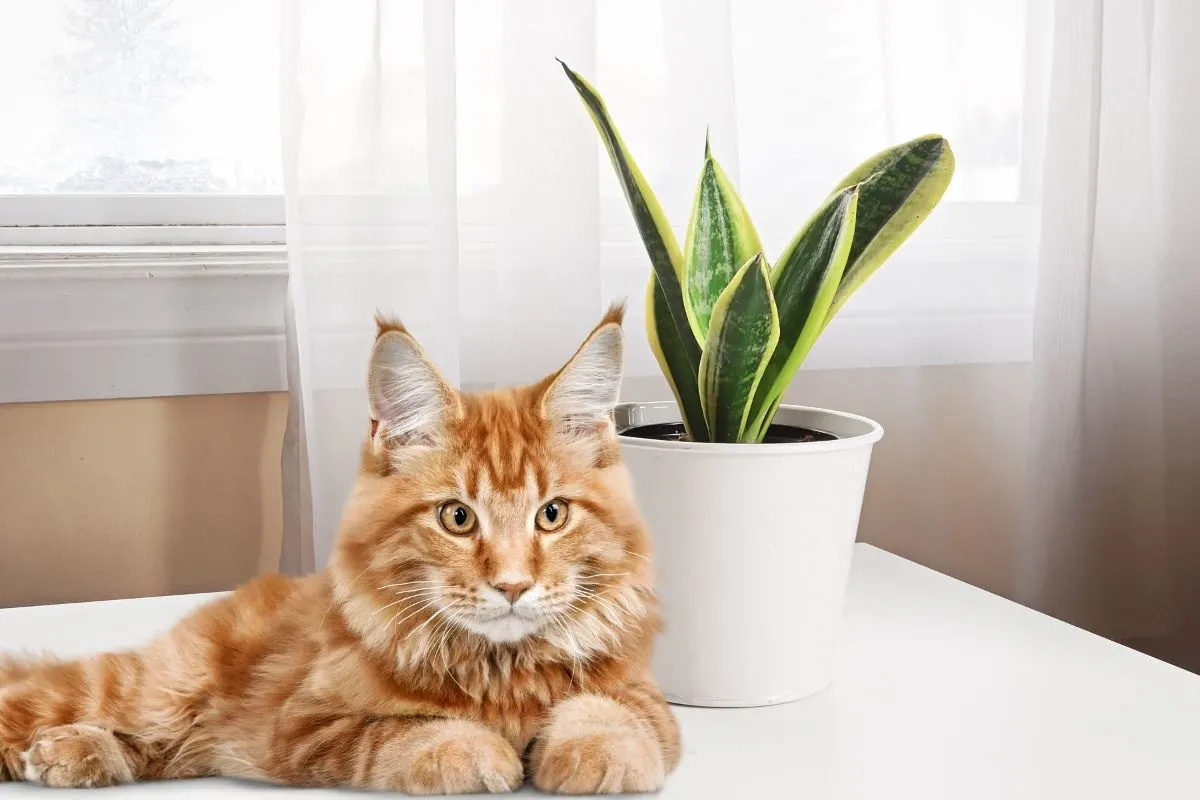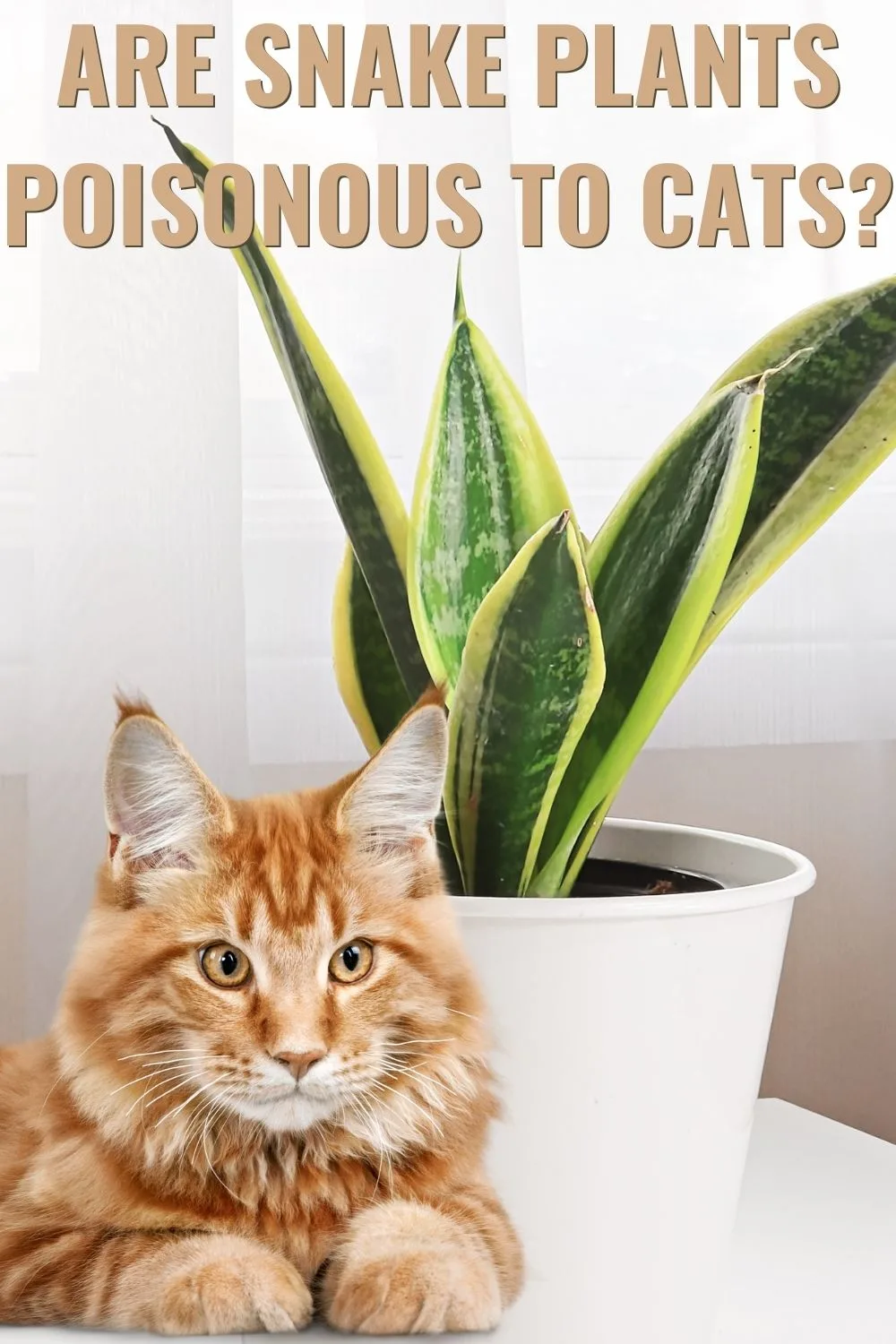Are snake plants poisonous to cats? It’s a question every cat and plant owner should be asking. Whether you call them snake plant or Mother-in-law’s tongue, what everyone agrees on is that Sanserviera trifasciatas are attractive and easy-to-keep houseplants. This is one of the most common houseplants found throughout the United States, but if you have cats, beware.
As every cat owner knows, cats are naturally curious creatures who like to inspect everything in their kingdom. If your kitty is more than just a little interested in your snake plant, then it is a good idea to move it out of reach. Let’s explore why.
Yes, they are poisonous to cats. They contain natural plant toxins called saponins, which can cause abdominal discomfort and diarrhea, but it is unlikely to be fatal for a cat. However, the cat may experience an allergic reaction which may be more serious.

There’s no way to know how your cat will react until it happens, and that’s not a risk you’d really want to take with a beloved pet. Let’s look into this further to see how snake plants are dangerous to felines and also what you can do to prevent any accidents.
What to Do About Cats and Plants
It’s important you keep your cats from accessing your snake plants because they can be very dangerous. This popular houseplant can cause anything from skin irritation to vomiting or even death in extreme cases. Snake plants’ toxic nature means it’s best to keep them away from your cats, even if your cat has never shown an interest in it.
The plant itself tastes bitter so most cats won’t go back for a second bite anyway, but you don’t want to take that chance with your beloved pet. Pet owners have a duty to keep their fur babies safe in every way they can. Eating any amount of the plant will have adverse effects for a cat, and you should remain alert to any symptoms that it may exhibit.
For most cat lovers, it’s just not worth the risk. So unless you can keep the plant out of reach of your cat, getting rid of it is your safest bet. Let’s learn more.
Are Snake Plants Dangerous To Cats?
Snake plant poisoning is not pleasant and it’s not anything you want your furry feline to have to suffer through. You have a duty to keep all poisonous plants away from your pets but in order to do that, you need to know how to identify them.
The snake plant is one that needs to be on your no-no list.
Whether you caught your cat red-pawed or have just noticed tooth marks in your snake plant, keep a close eye on your cat for any adverse reaction. If your cat has consumed a piece of a snake plant, there are a few things that may happen.
- Stomach cramps and abdominal discomfort
- Vomiting
- Diarrhea that can lead to dehydration
- Allergic reaction
If you notice any of these signs, it is a good idea to take your cat to a veterinarian to be checked out immediately. Take note of how much of the snake plant is missing. Also, keep track of all symptoms so that the veterinarian can quickly record any changes in the cat’s condition.
The most common symptoms after a cat ingests pieces of snake plant are abdominal discomfort and diarrhea. Snake plant sap is a purgative, so it will quickly loosen up anything and everything in the cat’s system. It is likely to gag and vomit and also have loose stools.
The result of diarrhea caused by eating a toxic snake plant is dehydration which can be dangerous. If your cat is showing symptoms of diarrhea or vomiting, have it checked out by a veterinarian. In serious cases, it may require a drip, so rather play it safe and err on the side of caution even if you only suspect your cat may have ingested a piece of snake plant.
In a few cases, which are far more serious, a cat may experience an allergic reaction to eating a piece of a snake plant leaf. The poison in the plant can cause the tongue and throat to swell. In extreme cases, the cat’s throat can close completely, leading to breathing issues that could be fatal.
Why Do Cats Eat Mother-in-law’s Tongue?
A cat might nibble the end of a snake plant out of curiosity, but the first taste of the bitter sap usually puts them off for good. If it is planted outside and other interesting plants are available, the cat is unlikely to chew on it again. However, if it is an inside cat and your snake plant is the only plant available, you may need to move it to an inaccessible position.
In the wild, cats chew plant material to help to aid digestion and obtain trace elements that are not found in meat. Much like you would take an antacid after a heavy meal, cats will often find a piece of grass to chew to aid digestion. If your snake plant is the only available plant option, then your cat might be more tempted to eat bits of it.
It’s important to know that they are toxic to cats, so if you have a cat, a good option is to provide a safe alternative that it can occasionally nibble on. Pet grass, which is not the same as catnip, is inexpensive and available at most pet stores or garden centers. You can even learn to grow your own at home so your cat will always have a safe, tasty treat.
What Is The Treatment If My Cat Has Eaten Snake Plant?
It is important to note that while it may not be fatal, Mother-in-law’s tongue is toxic and serious symptoms which include pain and discomfort, are highly like to result. So if your cat has consumed any amount of plant, get it checked out so that its condition does not deteriorate.
There is no antidote for snake plant poisoning, but the symptoms can be monitored and managed. The toxins that the cat has ingested will need time to work their way through its system. Your veterinarian will manage the nausea and diarrhea so that your cat does not become dehydrated.
The effects of an allergic reaction from nibbling or chewing a piece of snake plant are far more serious. Your veterinarian will be able to give antihistamines which will reduce the swelling and clear the cat’s airway, and your furry friend should make a full recovery in a few days.
How Much Snake Plant Is Toxic To A Cat?
Any amount of snake plant is toxic to a cat if it is ingested. The entire plant contains saponins which may even cause a rash if sap gets onto human skin. However, if a cat only gets a tiny lick of the bitter juice, it may just experience a slight swelling of the tongue and throat.
The severity of any reaction from a cat eating bits of a snake plant will depend on how much it has consumed and whether or not it has an allergic reaction. In the best scenario, it may only get a bad taste in its mouth, and in the worst, it could experience a life-threatening allergic reaction.
Therefore, it is vital that if your cat has eaten a piece of snake plant, it is closely monitored for symptoms and taken to a veterinarian as soon as possible. It’s always better to play it safe than to be sorry later. Your cat may act fine at first, but then have complications later. Your vet will be trained to know exactly what to look for and how to help your cat immediately. There is no time to waste in a potential poisoning situation so always err on the side of caution.
Are Snake Plants Poisonous To Cats? – Conclusion
As you can learn from this post, snake plants are versatile and popular houseplants, but they are also poisonous to cats. Although they may not be fatal, consuming any part of these sword-shaped plants can be dangerous for our feline friends. If you suspect that your cat has ingested a piece of snake plant, it is recommended that the animal be taken to a veterinarian immediately. It’s better to get the upper hand in a potentially dangerous situation. Ideally, you’d prevent it from ever happening in the first place.
The best thing pet parents can do is keep all plants, but especially toxic plants, away from their pets. Stick with cat-friendly houseplants or keep all of your plants outside, in a sunroom the cats can’t access, or put inside cages that keep the cats from accessing them. Cat owners who are also houseplant enthusiasts have found many creative ways to keep their plants while also keeping their cats safe.
Do you have any tips to add for keeping your cats away from your plants?

